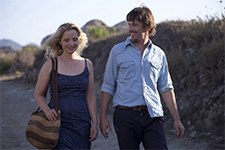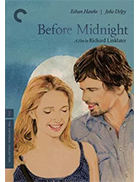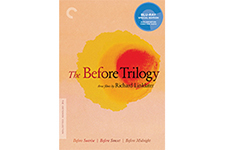Before Midnight
|  You could watch Richard Linklater’s Before Midnight as an intense, knowing, and at times harrowing self-contained portrait of middle-age grieving the life we expected to lead, but aren’t. Yet, it doesn’t stand on its own, but is rather the third entry in a compelling, unique series of films that began with Before Sunrise in 1995 and continued with Before Sunset in 2003. In each of these three films, spaced nine years apart, we follow the relationship between Jesse (Ethan Hawke), an American, and Céline (Julie Deply), a Parisian. They fell in love in the first film as idealist twentysomethings walking around Vienna together, then reconnected in the second film as early thirtysomethings finding their way into adulthood. Before Midnight finds them fully ensconced in the adult world, managing often competing responsibilities involving children, careers, and the messy daily chores of domestic life while secretly harboring various disappointments and frustrations that have over the years simmered into near-boiling hatred. The screenplay, which was penned by Linklater and his two stars, is something of a ticking bomb, which makes it a twist on the previous two films, both of which set their romantic plots against a clock (in the first film Céline has to catch an early morning train and in the second Jesse has to catch an early evening flight). Things in the third film are destined to exploded, and explode they do. But, before things become turbulent, Linklater provides us with a glimpse into the life of the romantic idealists who have settled into a steady, middle-age relationship (they are not technically married, but might as well be). Jesse, having left his wife after the events in Before Sunset, has been living with Céline for almost a decade now. They have 7-year-old twin girls together, and Hank (Seamus Davey-Fitzpatrick), Jesse’s son from his first marriage, is now a teenager. Jesse is feeling a hard sense of regret that, having chosen to live in Europe with Céline, he has not been a part of Hank’s life except during summers and occasional trips to the U.S. When the film begins, he is dropping Hank off at the airport to return to the States after spending the summer with his dad. They are at the end of a six-week stay in Greece at the home of a famous Greek author (Walter Lassally), which suggests how successful Jesse has become as a literary figure since we last saw him on a book tour promoting his first novel. The first half of the story, which unfolds over a single day, follows Jesse and Julie’s conversation in the car on the ride back from the airport, which is generally good-humored, but is also punctuated with bits of tensions surrounding Jesse’s regret at not having been a more substantial part of his son’s life and Céline’s assumption that he wants them to leave their life in Europe and move to the U.S. This is followed by a dinner at the author’s house with various friends, which brings up more simmering tensions regarding romance, sex, and gender roles, thus setting the stage for the film’s third act, which finds Jesse and Céline in a hotel room booked by their friends for a romantic final night together before heading home. Their night at the hotel is anything but romantic, as a sexual tryst is interrupted by a phone call that then sends them into a downward spiral of increasingly intense fighting, much of which is fueled by Céline’s lingering qualms about the path her life has taken and the resentment she feels toward Jesse, who appears to be living his dream of being a success author, several of whose books are based on his relationship with her. Their life together has become, ironically, the awful future image that Jesse used to tempt Céline to get off the train with him in Vienna 18 years earlier: “You’re married, only your marriage doesn’t have that same energy that it used to have, and you start to blame your husband. Think of this as time travel, from then to now.” Céline resents being the mother figure expected to pick up after and take care of every one; she resents being Jesse’s muse, reduced to an idealization on the page and used to fuel his success; she resents the conflict and guilt she feels about trying to pursue her own career in environmental issues; and she resents what she sees as Jesse’s fundamental selfishness. Jesse counters that he has tried to support her, that they divide childcare, and that her accusations are often unfair and misplaced, but at the same time he plays into many of her criticisms, proving himself to be exactly the “closet machismo” she accused him of being at dinner. All of this makes Before Midnight a very different film from its predecessors, and it also makes it a much more difficult film to watch, especially if you have internalized the romantic notions the characters espoused in the first film and recognize how so many of the fears they had at that time about growing old in a relationship have come to fruition. In a sense, they have become the violently bickering German couple that Céline got up and moved away from on the train in the very first scene of Before Sunrise, the fated event that first brought her and Jesse together. The beautiful telephone scene in that film, where they pretend to talk to their friends on the phone about this amazing romance they’re currently having, becomes a distant memory as they unload on each other a decade’s worth of anger and frustration and disappointment. Even when it appears that things are going well—that they’re connecting and loving—they are always one or two words away from another fight. Accusations fly, mostly from Céline about everything from Jesse’s unwillingness to recognize her domestic work, to her suspicion that he has been unfaithful, and the film is suffused with anger in a way that is disheartening, but resolutely authentic. Both Hawke and Delpy have clearly aged from their heyday in the mid-1990s, and they don’t try to hide it, which makes their characters feel more real. There is real life in the lines on Hawke’s face and the extra weight on Delpy’s body. This, of course, makes the film sound like a despondent slog through relational breakdown, and in some ways it is. As I said, it is not an easy film to watch, but the hard truths that Linklater and his actor-collaborators dig into are important and meaningful. There are times when the fighting takes on too theatrical a quality, and you get a sense that the dialogue is designed primarily to keep the intensity up. Yet, more often than not Jesse and Céline say things that have exactly the kind of biting quality that can only come from two people who know each so well. And that, of course, is the most brutal irony: To truly hurt someone emotionally, to know exactly what buttons to push, you have to know that person inside and out—his or her weaknesses, fears, failings, and embarrassments. And Jesse and Céline definitely know what buttons to push. Yet, the film ends on a note that could possibly be described as graceful, although you might see it as willfully turning a blind eye on dysfunction. That is, just like the ending of Before Sunrise, it is a kind of litmus test, and how you read those final lines of dialogue as Linklater’s camera slowly draws away from the couple we’ve gotten to know over nearly two decades will say much about how you view long-term relationships and the possibility of true love enduring through the years.
Copyright © 2017 James Kendrick Thoughts? E-mail James Kendrick All images copyright © The Criterion Collection | |||||||||||||||||||||||||||||||||||
Overall Rating: 


 (3.5)
(3.5)


 Before Sunset is available exclusively as a part of the three-disc “Before Trilogy” boxset, which also includes Before Sunrise (1995) and Before Sunset (2004).
Before Sunset is available exclusively as a part of the three-disc “Before Trilogy” boxset, which also includes Before Sunrise (1995) and Before Sunset (2004). 